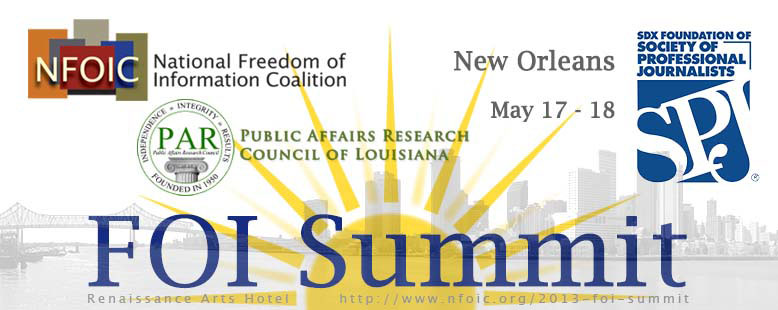 |
| (Background shot of New Orleans skyline from M. Lamar Griffin, Sr. via WikiCommons.) |
The National Freedom of Information Coalition and state host, the Public Affairs Research Council of Louisiana convened the 2013 FOI Summit Friday, May 17, and Saturday, May 18, from the Renaissance Arts Hotel in New Orleans.
Agenda
Friday, May 17
3:00 – 4:00 p.m. — Yes, You CAN . . . on a Shoestring: Practical tips for the most vexing challenges facing NFOIC member coalitions, from effective ways to advocate for better open government and laws without running afoul of IRS lobbying rules to maintaining an effective Web presence and fundraising in an era when foundation money is hard to find and eroding business models are negatively affecting the generosity of traditional media-industry donors.
4:15 – 5:30 p.m. — Ideas Marketplace: FOI advocates and coalition leaders from around the country talk about noteworthy success stories, problems they’ve encountered or just interesting tidbits worth sharing in an open but moderated, roundtable conversation.
Saturday, May 18
9:00 – 10:15 a.m. — The Deliberative Process 150 years Post-Lincoln: Thanks to Oscar-nominated filmmakers and historian Doris Kearns Goodwin, moviegoers got a glimpse of back room horse trading that made the 13th Amendment possible. Today, the parameters of privileges and exemptions that allow pre-decisional secrecy, and withholding of unfinished drafts, are frequent topics of debate, even litigation. Can today’s worst actors who stretch those limits claim they are standing on the shoulders of giants? How much access does transparent government demand? How much confidential counsel does it permit?
10:30 – 11:45 a.m. — Not a Picayune Problem: How is the changing news media environment and the gradual reshaping of the newspaper business affecting the use and effectiveness of freedom of information requests and other journalistic efforts on behalf of open and accountable government? Who in the media world are the new vanguards of public information advocacy, and what are their motives? New Orleans provides a microcosm of the nationwide trends taking place at the intersection of changing public media and open records. In the Crescent City, The Times-Picayune is transitioning out of daily publication, TV stations are ramping up their coverage teams, new investigative journalism outlets are taking hold and special interest bloggers are trying to make an impact. This panel looks at these developments and measures their impacts on public service.
2:15 – 3:30 p.m. — Digital Dodges and the Email Sleight of Hand: A panel of battle-tested experts discuss best practices and best outcomes when issues related to email and digital communications are legislated or litigated in your state. Are electronic records at least as accessible as paper records would be? Are retention policies adequate, without too much discretion given to records custodians themselves? Is anyone positing the silly notion that communications about government business become private if a sneaky underhanded public official uses his own personal computer or private email account?
3:45 – 5:00 p.m. — Technology and Access: Promise, Possibility and Perils: In an era when neither unmanned drones nor global positioning devices qualify as futuristic, technological advances have greatly expanded the capacity for access and citizen engagement. But they also give rise to concerns about privacy and other rights infringements. Some agencies understand that “public” now means online and are sharing their data with the public. In other instances, citizens have pried it loose and shared it. However, in the case of the gun database published by the Journal-News of Westchester, NY, or the controversial use of mug shots gathered by law enforcement, publishing without careful consideration and public communication can hurt the cause of freedom and give rise to unwanted new restrictions. A panel of experts discusses techniques and strategies for getting data and approaches for presenting it in ways that don’t risk future access to that data, and also examines whether government policies should take into account what the public wants to do with data or any other public information.
